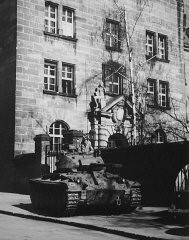You searched for: trial
<< Previous | Displaying results 181-190 of 544 for "trial" | Next >>
-
Translators at the International Military Tribunal
FilmThis film clip shows translators in action at the Nuremberg trial. English, French, Russian, and German were the official languages of the Nuremberg trials. Interpreters provided simultaneous translations of the court proceedings which were then available to the trial participants via headphones.
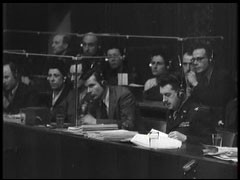
-
Reichstag fire
FilmThis footage shows the Reichstag (German parliament) building on the day after it was set on fire. While the origins of the fire on February 27 are still unclear, Hitler blamed Communists for the incident. The Reichstag Fire Decree of February 28, 1933, suspended constitutional guarantees. Communist and Socialist deputies were expelled from the parliament. Shortly after the decree was issued, the Nazis established concentration camps for the internment of political opponents.
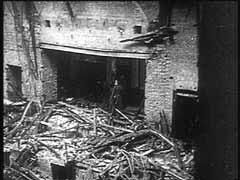
-
Thomas Buergenthal describes operations of international tribunals
Oral HistoryJudge Thomas Buergenthal was one of the youngest survivors of the Auschwitz and Sachsenhausen concentration camps. He immigrated to the United States at the age of 17. Judge Buergenthal devoted his life to international and human rights law. He served as chairman of the United States Holocaust Memorial Museum’s Committee on Conscience; was named the Lobingier Professor of Comparative Law and Jurisprudence at the George Washington University Law School; and served for a decade as the American judge at…
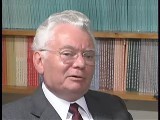
-
Thomas Buergenthal discusses whether it is ever too late to seek justice
Oral HistoryJudge Thomas Buergenthal was one of the youngest survivors of the Auschwitz and Sachsenhausen concentration camps. He immigrated to the United States at the age of 17. Judge Buergenthal devoted his life to international and human rights law. He served as chairman of the United States Holocaust Memorial Museum’s Committee on Conscience; was named the Lobingier Professor of Comparative Law and Jurisprudence at the George Washington University Law School; and served for a decade as the American judge at…
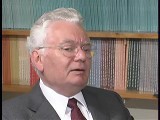
-
John Dolibois describes attitude of captured Nazi leaders
Oral HistoryJohn Dolibois immigrated to the United States in 1931 at the age of 13. After graduating from college, Dolibois joined the 16th Armored Division of the US Army. Due to his German language skills, he became involved in military intelligence. He returned to Europe in this capacity toward the end of World War II. Dolibois interrogated German prisoners of war, including leading Nazis, in preparation for the postwar trials of war criminals. He was later appointed US ambassador to Luxembourg, his birthplace.
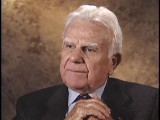
-
Belle Mayer Zeck reflects upon the sentences given to leaders of the economy
Oral HistoryBelle Mayer trained as a lawyer and worked for the General Counsel of the US Treasury, Foreign Funds Control Bureau. This bureau worked to enforce the Trading With the Enemy Act passed by Congress. In this capacity, Mayer became familiar with the German I. G. Farben chemical company, a large conglomerate that used slave labor during World War II. In 1945, Mayer was sent as a Department of Treasury representative to the postwar London Conference. She was present as representatives from the Allied nations…
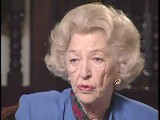
-
William (Bill) Zeck describes the "superior orders" defense
Oral HistoryBefore joining the US Army, Zeck—a lawyer—worked for the Board of Economic Warfare. In 1946, he was hired to work on preparations for the Nuremberg trials. In his search for documents pertaining to the I. G. Farben company's involvement in the war, Zeck also met attorney Belle Mayer, his future wife. Both Zeck and Mayer were involved in preparing the indictment in the I. G. Farben trial held at Nuremberg.
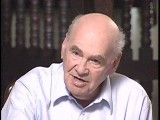
-
John Dolibois describes translating for a prison psychiatrist
Oral HistoryJohn Dolibois immigrated to the United States in 1931 at the age of 13. After graduating from college, Dolibois joined the 16th Armored Division of the US Army. Due to his German language skills, he became involved in military intelligence. He returned to Europe in this capacity toward the end of World War II. Dolibois interrogated German prisoners of war, including leading Nazis, in preparation for the postwar trials of war criminals. He was later appointed US ambassador to Luxembourg, his birthplace.

-
Presenting the prosecution's case at the International Military Tribunal
PhotoUS Major Frank B. Wallis (standing center), a member of the trial legal staff, presents the prosecution's case to the International Military Tribunal at Nuremberg. A chart (top left) shows where the defendants (bottom left) fit into the organizational scheme of the Nazi Party. At right are lawyers for the four prosecuting countries. Nuremberg, Germany, November 22, 1945. The trials of leading German officials before the International Military Tribunal are the best known of the postwar war crimes trials.…
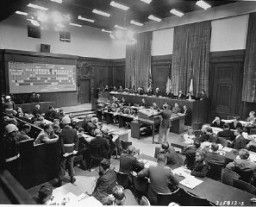
-
Tank guarding the entrance to the Palace of Justice in Nuremberg
PhotoA tank guards the entrance to the Palace of Justice in Nuremberg, Germany, site of the International Military Tribunal. The trial formally opened in on November 20, 1945, just six and a half months after Germany surrendered.
